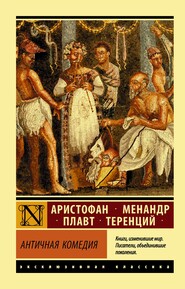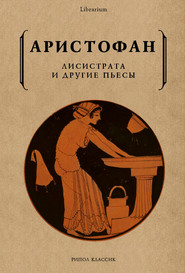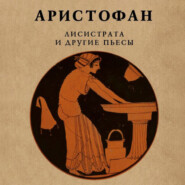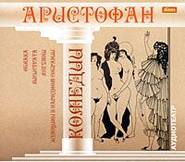По всем вопросам обращайтесь на: info@litportal.ru
(©) 2003-2024.
✖
The Eleven Comedies, Volume 2
Автор
Год написания книги
2018
Настройки чтения
Размер шрифта
Высота строк
Поля
BDELYCLEON. And what will the suit be about?
PHILOCLEON. The shade of an ass.[38 - The story goes that a traveller who had hired an ass, having placed himself in its shadow to escape the heat of the sun, was sued by the driver, who had pretended that he had let the ass, not but its shadow; hence the Greek proverb, to quarrel about the shade of an ass, i.e. about nothing at all.]
BDELYCLEON. You are a poor man of very little wit, but thoroughly brazen.
PHILOCLEON. A poor man! Ah! by Zeus! you know not now what I am worth; but you will know when you disembowel the old Heliast's money bag.[39 - When you inherit from me.]
BDELYCLEON. Come, get back indoors, both you and your ass.
PHILOCLEON. Oh! my brethren of the tribunal! oh! Cleon! to the rescue!
BDELYCLEON. Go and bawl in there under lock and key. And you there, pile plenty of stones against the door, thrust the bolt home into the staple, and to keep this beam in its place roll that great mortar against it. Quick's the word.
SOSIAS. Oh! my god! whence did this brick fall on me?
XANTHIAS. Perhaps a rat loosened it.
SOSIAS. A rat? 'tis surely our gutter-judge,[40 - There is a similar incident in the 'Plaideurs.'] who has crept beneath the tiles of the roof.
XANTHIAS. Ah! woe to us! there he is, he has turned into a sparrow; he will be flying off. Where is the net? where? pschit! pschit! get back!
BDELYCLEON. Ah! by Zeus! I would rather have to guard Scioné[41 - A Macedonian town in the peninsula of Pallené; it had shaken off the Athenian yoke and was not retaken for two years.] than such a father.
SOSIAS. And how that we have driven him in thoroughly and he can no longer escape without our knowledge, can we not have a few winks of sleep, no matter how few?
BDELYCLEON. Why, wretch! the other jurymen will be here almost directly to summon my father!
SOSIAS. Why, 'tis scarcely dawn yet!
BDELYCLEON. Ah, they must have risen late to-day. Generally it is the middle of the night when they come to fetch him. They arrive here, carrying lanterns in their hands and singing the charming old verses of Phrynichus' "Sidonian Women";[42 - A disciple of Thespis, who even in his infancy devoted himself to the dramatic art. He was the first to introduce female characters on the stage. He flourished about 500 B.C., having won his first prize for Tragedy in 511 B.C., twelve years before Aeschylus.] 'tis their way of calling him.
SOSIAS. Well, if need be, we will chase them off with stones.
BDELYCLEON. What! you dare to speak so? Why, this class of old men, if irritated, becomes as terrible as a swarm of wasps. They carry below their loins the sharpest of stings, with which to sting their foe; they shout and leap and their stings burn like so many sparks.
SOSIAS. Have no fear! If I can find stones to throw into this nest of jurymen-wasps, I shall soon have them cleared off.
CHORUS. March on, advance boldly and bravely! Comias, your feet are dragging; once you were as tough as a dog-skin strap and now even Charinades walks better than you. Ha! Strymodorus of Conthylé, you best of mates, where is Euergides and where is Chales of Phyla? Ha, ha, bravo! there you are, the last of the lads with whom we mounted guard together at Byzantium.[43 - Originally subjected to Sparta by Pausanias in 478 B.C., it was retaken by Cimon in 471, or forty-eight years previous to the production of 'The Wasps.' The old Heliasts refer to this latter event.] Do you remember how, one night, prowling round, we noiselessly stole the kneading-trough of a baker's-wife; we split it in two and cooked our green-stuff with it.—But let us hasten, for the case of the Laches[44 - An Athenian general, who had been defeated when sent to Sicily with a fleet to the succour of Leontini; no doubt Cleon had charged him with treachery.] comes on to-day, and they all say he has embezzled a pot of money. Hence Cleon, our protector, advised us yesterday to come early and with a three days' stock of fiery rage so as to chastise him for his crimes. Let us hurry, comrades, before it is light; come, let us search every nook with our lanterns to see whether those who wish us ill have not set us some trap.
BOY. Ah! here is mud! Father, take care!
CHORUS. Pick up a blade of straw and trim the lamp of your lantern.
BOY. No, I can trim it quite well with my finger.
CHORUS. Why do you pull out the wick, you little dolt? Oil is scarce, and 'tis not you who suffer when it has to be paid for. (Strikes him.)
BOY. If you teach us again with your fists, we shall put out the lamps and go home; then you will have no light and will squatter about in the mud like ducks in the dark.
CHORUS. I know how to punish other offenders bigger than you. But I think I am treading in some mud. Oh! 'tis certain it will rain in torrents for four days at least; look, what thieves are in our lamps; that is always a sign of heavy rain; but the rain and the north wind will be good for the crops that are still standing…. Why, what can have happened to our mate, who lives here? Why does he not come to join our party? There used to be no need to haul him in our wake, for he would march at our head singing the verses of Phrynichus; he was a lover of singing. Should we not, friends, make a halt here and sign to call him out? The charm of my voice will fetch him out, if he hears it.
Why does the old man not show himself before the door? why does he not answer? Has he lost his shoes? has he stubbed his toe in the dark and thus got a swollen ankle? Perhaps he has a tumour in his groin. He was the hardest of us all; he alone never allowed himself to be moved. If anyone tried to move him, he would lower his head, saying, "You might just as well try to boil a stone." But I bethink me, an accused ma escaped us yesterday through his false pretence that he loved Athens and had been the first to unfold the Samian plot.[45 - The Samians were in league with the Persians, but a certain Carystion betrayed the plot, and thanks to this the Athenians were able to retake Samos before the island had obtained help from Asia.] Perhaps his acquittal has so distressed Philocleon that he is abed with fever—he is quite capable of such a thing.—Friend, arise, do not thus vex your hear, but forget your wrath. Today we have to judge a man made wealthy by treason, one of those who set Thrace free;[46 - The towns of Thrace, up to that time the faithful allies of Athens, were beginning to throw off her yoke.] we have to prepare him a funeral urn … so march on, my boy, get a-going.
BOY. Father, would you give me something if I asked for it?
CHORUS. Assuredly, my child, but tell me what nice thing do you want me to buy you? A set of knuckle-bones, I suppose.
BOY. No, dad, I prefer figs; they are better.
CHORUS. No, by Zeus! even if you were to hang yourself with vexation.
BOY. Well then, I will lead you no father.
CHORUS. With my small pay, I am obliged to buy bread, wood, stew; and now you ask me for figs!
BOY. But, father, if the Archon[47 - Who fulfilled the office of president.] should not form a court to-day, how are we to buy our dinner? Have you some good hope to offer us or merely "Hellé's sacred waves"?[48 - Meaning, "Will it only remain for us to throw ourselves into the water?" Hellé, taken by a ram across the narrow strait, called the Hellespont after her name, fell into the waves and was drowned.]
CHORUS. Alas! alas! I have not a notion how we shall dine.
BOY. Oh! my poor mother! why did you let me see this day?
CHORUS. Oh! my little wallet! you seem like to be a mere useless ornament!
BOY. 'Tis our destiny to groan.
PHILOCLEON.[49 - He is a prisoner inside, and speaks through the closed doors.] My friends, I have long been pining away while listening to you from my window, but I absolutely know not what do do. I am detained here, because I have long wanted to go with you to the law court and do all the harm I can. Oh! Zeus! cause the peals of they thunder to roll, change me quickly into smoke or make me into a Proxenides, a perfect braggart, like the son of Sellus. Oh, King of Heaven! hesitate not to grant me this favour, pity my misfortune or else may thy dazzling lightning instantly reduce me to ashes; then carry me hence, and may thy breath hurl me into some burning pickle[50 - This boiling, acid pickle reminds him of the fiery, acrid temper of the heliasts.] or turn me into one of the stones on which the votes are counted.
CHORUS. Who is it detains you and shuts you in? Speak, for you are talking to friends.
PHILOCLEON. 'Tis my son. But no bawling, he is there in front asleep; lower your voice.
CHORUS. But, poor fellow, what is his aim? what is his object?
PHILOCLEON. My friends, he will not have me judge nor do anyone any ill, but he wants me to stay at home and enjoy myself, and I will not.
CHORUS. This wretch, this Demolochocleon[51 - A name invented for the occasion; it really means, Cleon who holds the people in his snares.] dares to say such odious things, just because you tell the truth about our navy!
PHILOCLEON. He would not have dared, had he not been a conspirator.
CHORUS. Meanwhile, you must devise some new dodge, so that you can come down here without his knowledge.
PHILOCLEON. But what? Try to find some way. For myself, I am ready for anything, so much do I burn to run along the tiers of the tribunal with my voting-pebble in my hand.
CHORUS. There is surely some hole through which you could manage to squeeze from within, and escape dressed in rags, like the crafty Odysseus.[52 - When he entered Troy as a spy.]
PHILOCLEON. Everything is sealed fast; not so much as a gnat could get through. Think of some other plan; there is no possible hold of escape.
CHORUS. Do you recall how, when you were with the army at the taking of Naxos,[53 - The island of Naxos was taken by Cimon, in consequence of sedition in the town of Naxos, about fifty years before the production of 'The Wasps.'] you descended so readily from the top of the wall by means of the spits you have stolen?











